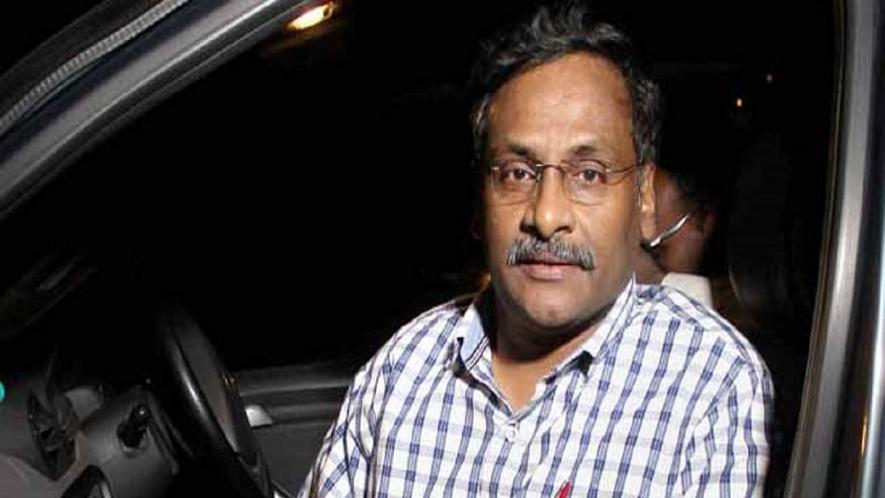Saibaba, Others to Stay in Jail as SC Suspends Bombay HC’s Acquittal Order

Former Delhi University professor G N Saibaba. Image Courtesy: Social Media
New Delhi:The Supreme Court on Saturday suspended the Bombay High Court order acquitting former Delhi University (DU) professor G N Saibaba and others in a Maoist-links case.
The top court rejected Saibaba's request to order his release from jail due to his disability and health conditions and put him under house arrest after the Maharashtra government opposed the prayer, saying nowadays, there is a new tendency of "urban naxals" to seek house arrest.
The high court acquitted Saibaba and others in the case on Friday.
An apex court bench of justices M R Shah and Bela M Trivedi, which sat on a non-working day to hear the matter, rejected Saibaba's request for putting him under house arrest in view of his physical disability and health conditions.
"We are of the opinion that it is a fit case for exercise of power under section 390, CrPC (Code of Criminal Procedure) and suspend the impugned order of the high court," the bench said.
It stayed the release of all the accused in the case, including Saibaba, from jail, as directed by the Nagpur bench of the Bombay High Court.
It sought responses from Saibaba and the other accused by December 8 on a plea moved by the Maharashtra government against the high court order.
The top court said a detailed scrutiny is required with regard to the impugned judgment since the high court did not consider the merits of the case, including the gravity of the offence alleged against the convicts.
"The accused were convicted after detailed appreciation of evidence. Offences are very serious, which are against the interest of the society, sovereignty and integrity of India. The high court has not gone into all these aspects and passed the order based on sanction under UAPA," the bench said, while suspending the October 14 verdict of the high court.
Appearing for Saibaba, senior advocate R Basant said his client is paraplegic with 90-95% disability and wheelchair-bound with almost zero per cent mobility.
"He has a 23-year-old daughter and a wife. His bones are touching his lungs, which is further complicating the things. Looking at these aspects, please do not drag him back into jail. Please release him from jail and put him under house arrest and he will abide by any conditions which the court would impose," Basant said.
Opposing the prayer for house arrest, Solicitor General Tushar Mehta said, "Nowadays, there is a tendency of urban naxals that seek house arrest, but everything can be done from home. This house arrest cannot be an option."
Basant said the court may order for the cutting of Saibaba's phone lines.
During the hearing, Mehta claimed there were certain disturbing facts in the case and Saibaba was involved in various activities, including an armed separatist movement in Jammu and Kashmir, waging war against the democratic setup of the country and arranging meetings of Maoist commanders.
"He was their brain and used to propagate their ideology," Mehta said.
Referring to Mehta's submission, Basant said Saibaba may have some inclination towards the Maoist ideology, but he was certainly not their brain.
The bench said, "We are not referring to this case but in general. The brain is the most dangerous thing. For terrorists or Maoists, the brain is everything."
It framed several questions to be decided by the apex court and noted that Saibaba never raised the issue of absence of the mandatory sanction to prosecute under the Unlawful Activities (Prevention) Act (UAPA) during the trial stage and did so only at the appellate stage in the high court.
The bench also agreed with Mehta's submission that the high court did not pass an acquittal order but a discharge order and no finding of the trial court was reversed.
Justice Trivedi said it is a settled law that an acquittal order cannot be passed by an appellate court without reversing the findings of the trial court's conviction order.
More than eight years after his arrest, the Bombay High Court acquitted Saibaba on Friday and ordered his release from jail, noting that the sanction order issued to prosecute the accused in the case under the stringent provisions of the UAPA was "bad in law and invalid".
It allowed Saibaba's appeal, challenging a 2017 order of the trial court that convicted him in the case and sentenced him to life imprisonment.
Apart from Saibaba, the court acquitted Mahesh Kariman Tirki, Pandu Pora Narote (both farmers), Hem Keshavdatta Mishra (student) and Prashant Sanglikar (journalist), who were sentenced to life imprisonment, and Vijay Tirki (labourer), who was sentenced to 10 years in jail. Narote died during the appeal's pendency.
Saibaba (52), who is wheelchair-bound due to a physical disability, is currently lodged in the Nagpur central prison.
He was arrested in February 2014. In March 2017, a sessions court in Maharashtra's Gadchiroli district convicted the former DU professor and others, including a journalist and a Jawaharlal Nehru University (JNU) student, for alleged Maoist links and indulging in activities amounting to waging war against the country.
The court had held Saibaba and the others guilty under various provisions of the anti-terror law, UAPA, and the Indian Penal Code (IPC).
Get the latest reports & analysis with people's perspective on Protests, movements & deep analytical videos, discussions of the current affairs in your Telegram app. Subscribe to NewsClick's Telegram channel & get Real-Time updates on stories, as they get published on our website.
























